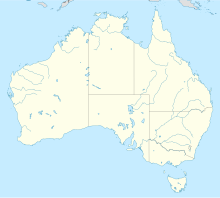Jeannie Gunn
Jeannie Gunn (born June 5, 1870 in Melbourne , † June 9, 1961 in Hawthorn ) was an Australian writer and teacher.
Life
Jeannie Gunn was born the fifth child of Scottish-born Thomas Johnstone Taylor and his wife Anna in Carlton, a suburb of Melbourne. Father and grandfather were pastors in Baptist churches . At the age of 17 she enrolled in the University of Melbourne. From 1889 to 1896 she ran a school with her sisters in their parents' house, after which she continued to work as a teacher elsewhere. In 1901 she married the explorer, rancher and journalist Aeneas Gunn, who was eight years her senior. In the following year he took over the management of the now defunct cattle farm Elsey Station in the tropical north of Australia near the village of Mataranka . It was considered unusual at the time that his wife accompanied him to this remote place. On March 1, 1903, Aeneas Gunn died of complications from malaria. Jeannie Gunn then returned to Melbourne.
In the following years the two books that made Jeannie Gunn famous were created: The Little Black Princess: a True Tale of life in the Never-Never describes the childhood of the native Dolly Bonson (* 1894; † March 3, 1988); We of the Never-Never , which appears like a novel, addresses the journey and stay of Jeannie and Aeneas Gunn at Elsey Station .
Jeannie Gunn died in Hawthorn on June 9, 1961 and was buried in Melbourne. She left a fortune of £ 12,181.
Works
- The Little Black Princess: a True Tale of life in the Never-Never , 1905
- We of the Never-Never , 1908
Individual evidence
Web links
- Jeannie Gunn in the Internet Movie Database (English)
- About Dolly Bonson
| personal data | |
|---|---|
| SURNAME | Gunn, Jeannie |
| ALTERNATIVE NAMES | Taylor, Jeannie (maiden name) |
| BRIEF DESCRIPTION | Australian writer and teacher |
| DATE OF BIRTH | June 5, 1870 |
| PLACE OF BIRTH | Melbourne , Australia |
| DATE OF DEATH | June 9, 1961 |
| Place of death | Hawthorn (Victoria) , Australia |
